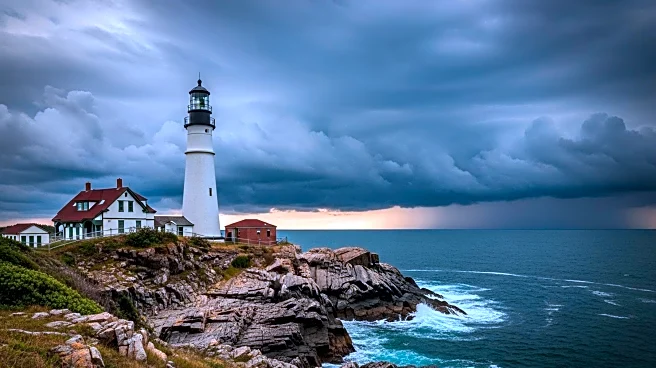What's Happening?
The Caribbean region is facing significant financial challenges due to the high cost of home insurance, exacerbated by the frequent occurrence of natural disasters such as hurricanes, earthquakes, and volcanoes. Many residents, like Dwight Benjamin from Barbuda, opt to build homes 'out of pocket' rather than taking on high-interest mortgages, resulting in a majority of homes being uninsured. In Jamaica, only 20% of homes have insurance coverage, and in Barbados, the figure is just half. Insurance premiums have surged by up to 40% in recent years, driven by increasing risks and small populations that offer poor returns for insurance companies. The Atlantic hurricane season, which peaks between mid-August and mid-October, poses a significant threat to northern Caribbean nations, including Antigua and Barbuda, the Bahamas, and the Dominican Republic.
Why It's Important?
The high cost of insurance and the lack of coverage for many homes in the Caribbean have profound implications for the region's economic stability and recovery efforts following natural disasters. Countries like Antigua and Barbuda, which are deeply indebted, rely heavily on international aid and organizations like the United Nations Development Programme (UNDP) for post-disaster recovery. The financial strain is compounded by the increasing frequency and intensity of storms, which are attributed to climate change. This situation highlights the urgent need for more resilient infrastructure and economic strategies to mitigate the impact of natural disasters and support affected communities.
What's Next?
As the hurricane season continues, Caribbean nations are likely to face further challenges in managing the economic impact of potential storms. The UNDP and other international bodies may need to increase their support to help rebuild and strengthen infrastructure. Additionally, there may be a push for more affordable insurance options and improved building techniques to enhance resilience against future disasters. Governments and communities will need to adapt to the changing climate and develop strategies to protect their populations and economies from the increasing threat of natural disasters.
Beyond the Headlines
The situation in the Caribbean underscores broader issues related to climate change and its impact on vulnerable regions. The increasing frequency and severity of storms not only threaten lives and property but also strain economic resources and highlight disparities in global aid distribution. The ethical considerations of international support and the responsibility of wealthier nations to assist those most affected by climate change are critical discussions that may arise from these challenges.









